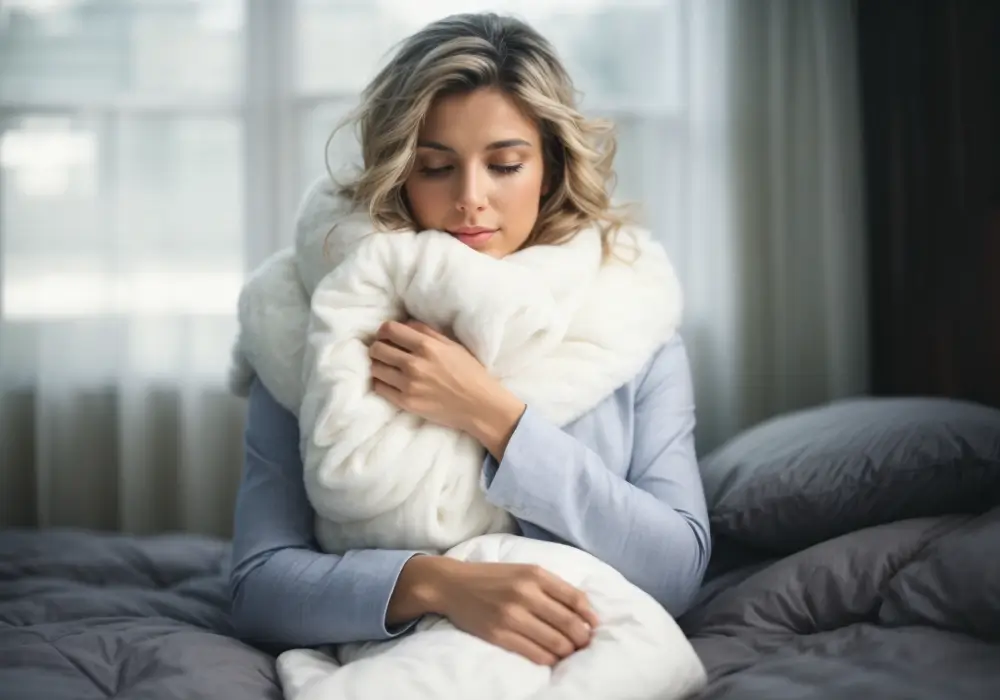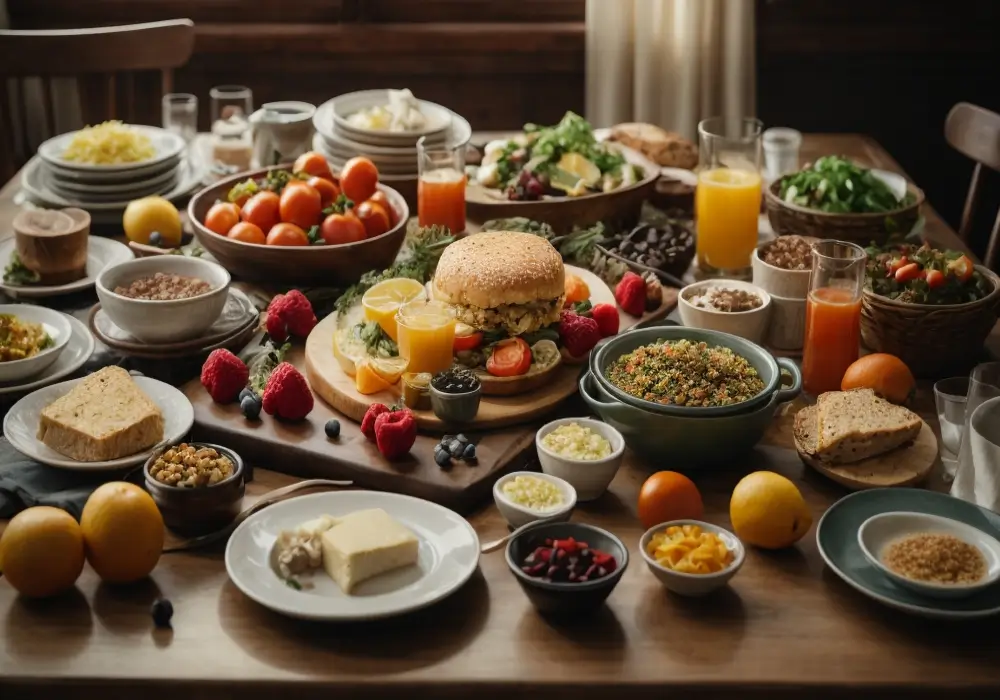
What helps you sleep better?
9 tips to help you fall asleep and sleep better
Sleep is simply the cornerstone of overall health. Even if you make every possible effort elsewhere, it will be practically undone as long as you don’t sleep well.
And believe me, I KNOW how sleeping well isn’t always easy; this is actually the biggest challenge of my life since my childhood. In my case, there will probably never be a magic solution, since like many autistic people, it is due to my circadian rhythm not functioning optimally.
Sleep is so important that you have to try everything to find what works for you. And sometimes it’s really simple tips and tricks that we just never thought of.
Do you sleep badly too? Here are 9 tips to help you fall asleep quickly and get restful sleep.
- Lower the temperature in your bedroom
When you sleep, there are a series of small events that take place in the body, and one of these is a slight drop in body temperature. So light it’s barely noticeable, but it’s essential nonetheless.
Lowering the thermostat by just 2 degrees, for example, can make this easier.
- Try a heavy blanket
I have one and if I look around me, there seem to be two types of people: those who panic at the idea of feeling “crushed” by such a blanket, and those who find it instantly soothing.
For an adult, these blankets usually weigh between 15 and 20 pounds and the principle is that being wrapped in this way (like when swaddling a baby) provokes a very rapid relaxation response for the body, but also for the mind. In my case, it also calms my anxiety to a certain extent.
If you don’t like it, the idea is just to try it in a store before buying it, because they are quite expensive!
- Eliminate screens before bedtime
We hear it a lot and it’s very difficult to apply, but it’s probably the most important thing to try. It’s a question of elementary biology: during the day, it’s important to be exposed to light, because that’s what tells our body to stay awake. Similarly, at night, exposing yourself to darkness rather dictates that it is time to sleep.
Until just 100 years ago, humans were exposed to very little light when it was dark outside (other than a few candles or perhaps an oil lamp). Whereas now, we are always enlightened until it is time to sleep: computer, tablet, television and telephone often accompany us to bed.
It is therefore difficult for our circadian rhythm to adapt, particularly with regard to screens since they emit a bluish light. these types of light waves interfere with the body’s ability to produce melatonin and therefore prevent the circadian rhythm from regulating itself.
In an ideal world, we turn off the screens at least 2 hours before bedtime.
- Make relaxation a priority
Setting up relaxation rituals every night can help a lot. Whether it’s taking a hot bath (not only does it help you relax, but the temperature contrast when you get out helps the body temperature to drop), lighting candles, adopting aromatherapy, doing a little yoga or meditation session.
It can also be taking a herbal tea, practicing relaxation exercises, listening to relaxing music, reading a pleasant book… It can be all of these at the same time!
- Limit caffeine
As a general rule, if you have trouble sleeping, you should have your last caffeinated drink of the day before noon. But for some people this is not enough and other measures are needed!
You can do different experiments: no caffeine after 10 a.m., have one coffee less during the day, have one coffee and see if that changes anything, etc. By the way, soda and energy drinks count too.
- Do everything to be comfortable before bedtime
Nothing should be left to chance: a mattress that suits you, comfortable sheets, a well-adapted pillow, etc.
Your clothes should follow this same rule. And just to test, try sleeping naked, it has many benefits for sleep!
- Not checking the clock at night
During the night, we go through different cycles of sleep, some deeper and some lighter, during which it is normal (up to a point) to wake up. The problem occurs rather when it is difficult to fall back asleep quickly or when you suffer from insomnia.
It won’t work miracles, but not looking at the clock in these cases can make a difference. In my case, not knowing what time it is when I wake up helps me stress less and fall back to sleep more easily. I haven’t had an alarm clock in my bedroom for years. It’s my phone that wakes me up, but during the night it’s placed in a closed drawer of my bedside table.
- Avoid strenuous sport in the evening
There are some people who can train at 10:30 p.m. and sleep like babies right after. But for others, it doesn’t work at all and it has the opposite effect. For my part, I can get away with a moderate training at maximum 7:30 p.m., otherwise, I will spend the night regretting it.
Individual responses vary, but this is partly because exercise releases adrenaline, which raises body temperature, boosts energy levels and heightens focus, all of which can prevent relaxation.
Above all, don’t stop yourself from playing sports! Exercise in general has very positive effects on sleep (and mental health). But if it’s difficult to fall asleep afterwards, it would be better to change the formula, such as getting up earlier to train in the morning, for example.
- Take natural supplements to sleep better
There are several and the quality varies, so I suggest you do your homework before buying any. Here is my arsenal, which I only use when needed:
- Melatonin
It is a hormone naturally secreted by the body when falling asleep, which also regulates body temperature as well as blood pressure. This hormone does not always seem to be on point for many people, among other things because of our stressed lives and the omnipresence of screens.
It can therefore be taken as a supplement, 30 minutes before bedtime. What you need to know: Although it is natural, melatonin should not normally be taken daily or “preventively” for a long time. If the body receives supplementation without stopping, it will understand that it no longer needs to produce it naturally, thus creating a vicious circle that we want to avoid at all costs!
Melatonin doesn’t work for everyone, and even if it works one night, that doesn’t mean it will the next day. It can only help if your natural melatonin levels are insufficient. If your difficulty falling asleep is due to something else, melatonin will be useless.
Melatonin sometimes allows me to have a deeper sleep than usual and therefore to rest more, but it is not magic either: the next morning. I tend to feel a bit off the mark (slight headache, a bit confused, less energy, etc.)
- Lemon balm
I’ve talked about this before (and it’s not an advertisement, just a sincere recommendation), but a few years ago I discovered the Well Cultured Canadian Health Company Sleep Booster and it works really well for me. .
These capsules contain organic lemon balm; they are effective because of the dosage. You can also take lemon balm as an herbal tea, but with one teaspoon of plant extract at a time, it can never be as much as two capsules, which contain the equivalent of a cup of lemon balm.
After 15 minutes, I start to feel much more relaxed (helps both sleep and anxiety) and allows me to sleep a little longer and deeper. Moreover, these capsules do not cause any side effects; you can even take it every day.
- CBD
I take it in the form of an oil, of which you place a few drops under the tongue 30 to 60 minutes before sleeping. It is the medicinal part of cannabis, which can also be produced from hemp.
There is no psychotropic effect, so it does not “freeze” and it does not alter the state of consciousness. On the other hand, it doesn’t have any effect either: when I take CBD oil, I feel a bit in a cocoon, as if I had taken Nyquil-style throat syrup.
It’s important to find the right dosage because taking more will certainly promote better sleep, but it can also lead to a slightly woozy effect the next morning. It again works for both sleep and anxiety, so it’s perfect for a “reset” once in a while.





